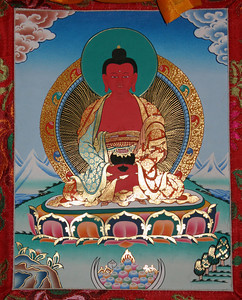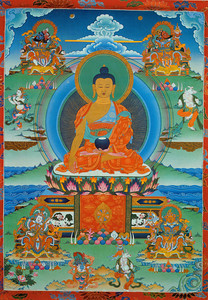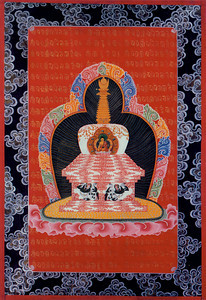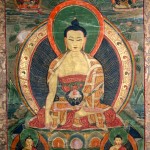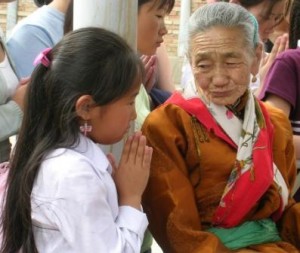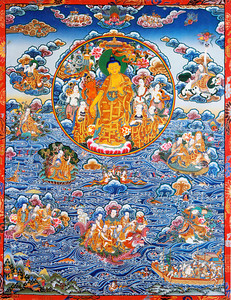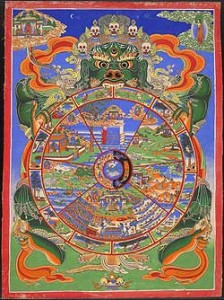
An excerpt from a teaching called How Buddhists Think by Jetsunma Ahkon Lhamo
Most people, however, fixated as they are on self-nature, experience hatred, greed, and ignorance. This is the content of their mindstream. We all have a great amount of self-concern, craving, desire, and grasping, which Buddhists consider a form of greed. We have abundant anger.
You know you have anger; everyone has anger, which Buddhists consider a form of hatred. And we have ignorance, which in Buddhist terminology signifies the lack of awareness of the primordial Wisdom State. It means the lack of being awake as the Buddha is awake.
In the Bardo, some of the latent karmic potential, or the karmic seeds in our mindstream, will ripen. For instance, if we have hatred within our mindstream, we will perceive it externalized as some kind of demonic entity––and respond with fear. And we will try to take rebirth as soon as possible. We will go compulsively into the next rebirth. So it’s very possible that we take rebirth in an undesirable form.
Even if we achieve again the precious human form, we might be reborn in poverty in Calcutta, or as the offspring of parents who have AIDS. And we ourselves could have AIDS. There is no way to predict how karma will ripen. This is the unpredictability of cyclic existence.
Of the six realms of cyclic existence, the human realm is considered the most precious––because it is the only realm in which we can practice Dharma in order to achieve Realization. In all the other realms, preoccupation with immediate experience is too tight, too intense––so much so that one cannot meditate, contemplate, or practice. This is true even in the higher realms.
The highest realm into which we can be reborn is the realm of the long-life gods. The suffering in this realm is actually related to pleasure. You may think, “I’d like to suffer like that,” but in this realm pleasure really is the source of suffering.
To be reborn in this realm requires tremendously good karma, but also involves the karma of pride. (It is your pride that will, despite a great accumulation of positive causes, keep you from being born in an Enlightened state.) Positive causes produce the experience of great pleasure which prevails in the long-life god realm. The scent there is an overpowering experience, sensual and erotic, healing instantly and completely. Any sense––touch, taste, sight, hearing––is so potent that one is completely intoxicated, completely consumed by it. The gods in this realm are extremely, excruciatingly beautiful. Their bodies are sweetly scented; their skin, exceedingly pure. They swim in nectar-like water; everything they taste is the elixir of life. And they live for thousands of years.
Some people may think: “How do I get into that place?” But there’s a catch. When the thousands of years of their god-realm karma are exausted, these beings begin to change. Suddenly they are no longer so sweet-smelling. Then the other gods and goddesses start to move away from them––as far away as they can.
Soon the god-realm beings whose good karma is depleted become aware that they are deteriorating. No longer are they quite so beautiful; their “high” is wearing off. They realize that they’ve used up all the fortunate causes they had accumulated for aeons. Since they have a touch of clairvoyance, they can look down and see that there is nowhere to go but to a lower rebirth. And they get no help from the other gods and goddesses, who are still absorbed in their intoxication. This is the most pleasurable rebirth. You suffer only as it ends.
Immediately below the long-life gods is the realm of the jealous gods. The causes for being reborn there are power-hunger, competitiveness, and jealousy. There is much wealth in this realm, and intoxication too, but of another sort––intoxication with power. There is continual warfare––and the suffering which comes from it. There is suffering, but also pleasure. The jealous gods are very powerful, very demanding. They engage in battle with other gods, and they sometimes become involved with other realms in order to use them for their warfare agenda.
Some say that the Old Testament God Jehovah is actually a jealous god, exhibiting the characteristics of this realm––wielding destruction and demanding exclusive allegiance.
The realm below the jealous gods is the human realm. In this realm, old age, sickness, and death are our main sufferings. If we live long enough, all of us experience them. One cause for being born human––instead of appearing miraculously in the state of Enlightenment––is doubt. Everyone in the human realm experiences doubt. You must look at yourself as if from the outside and recognize that doubt is an obstacle to your practice. We have the habitual tendency of only believing what we can see and hold in our hands.
We may not believe that there are non-physical realms. Well, we’ve heard of them, and think they may possibly exist. We think we may have lived before, but we don’t know for sure.
Right below the human realm is the animal realm, in which a rebirth results from “dullness.” The word actually translates as “stupidity,” but we hesitate to use that term because we all love animals. Here however we are focusing on the consciousness of animals and their inability to absorb the teachings needed to achieve Realization. They can’t reason, they can’t be taught in the way humans can. They’re tightly reactive, completely involved in their experience of phenomena, without any spaciousness between event and reaction.
A tiny bit of spaciousness is the difference between us and animals. Unlike them, we can consider and formulate in a creative way some kind of impression and response. An animal’s inability to do this is termed ignorance, or stupidity, or dullness. Animals are preyed upon by predators, pursued and eaten by one another. They are often at the mercy of humans, who eat them or use them for their own purposes. Animals suffer greatly from all that.
Below the animal realm is the realm of the hungry ghosts. These beings are not visible to our eyes, but we have information about them: the Buddha in his omniscience saw and described them. The cause for being reborn as a hungry ghost is grasping or desire. With very small mouths and very big stomachs, these beings are weak from hunger and hardly ever able to get what they need. They suffer from physical and other kinds of hunger and cannot be satisfied. They have the unfortunate karma of strange, mixed perception.
When you drink a cup of tea, it tastes like tea to you. (To long-life gods, it would taste like the most exquisite nectar.) Hungry ghosts would experience it as pus or another equally horrid substance. Their perception is askew because of their greed and desire.
The lowest rebirth is in the hell realms. The main causes for being reborn there are hatred and anger, and the suffering is tremendous. Who can claim a mind free of anger and hatred? If you’ve ever had a frightening nightmare from which you felt you could not escape, then you have the potential to create the phenomena of a hellish realm. It’s the same.
© Jetsunma Ahkön Lhamo
To download the complete teaching, click here and scroll down to How Buddhists Think
